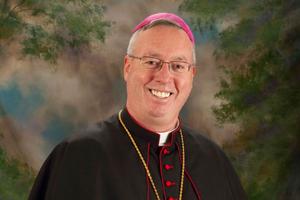Prayer and Fasting
EDITORIAL: Just as European Christians prayed the Rosary and fasted to be freed from the repressive Ottoman Empire, we need to employ the same strategy for peace in the Middle East and elsewhere.

Oct. 7 was a pivotal day long before 2023. More than 450 years earlier, it was the day Christian forces turned the tide of a 500-year conflict in Europe against the Ottoman Empire.
On Oct. 7, 1571, at the Battle of Lepanto, soldiers of the Holy League finally succeeded in defeating the Muslim Turks that had invaded their territory, killing and enslaving their peoples. Military force was not the power that broke the enemy. It was the Rosary — and all of Europe joined together in prayer at Pope St. Pius V’s request.
The evil unleashed in the Holy Land Oct. 7, 2023 — on the Catholic Church’s calendar, the feast of Our Lady of the Rosary, in memory of the Battle of Lepanto — demands an equally urgent response from Catholics throughout the world. Aside from the Vatican’s diplomatic efforts, Pope Francis seized the moment to draw on a power higher than politics. He called for two days of prayer and fasting: Oct. 17 and again on Oct. 27 for an end to the Israel-Hamas war.
For us as Catholics, the Holy Father’s urgent call to turn to Our Lord with a plea for peace signaled the gravity of the crisis we see unfolding in the Middle East, which threatens to engulf much more than a small 150-square-mile swath of land near Jerusalem. It’s a reminder that all of us have a stake in this conflict.
At press time, the Israel Defense Forces were poised to commence a massive ground offensive into Gaza to rescue hundreds of hostages and neutralize Hamas as a military and terrorist threat to Israel. The world held its collective breath, while the U.S., U.N. and others sought to de-escalate the conflict, knowing the devastating human toll of the urban warfare that would follow and the real danger that it could lead to a wider, even global, war.
It is still shocking to think of what has happened to bring the world to this precipice. On Oct. 7, Israel suffered its worst attack since the Yom Kippur War in 1973, when Hamas launched thousands of rockets toward Israel and dispatched gunmen in pickup trucks and motorcycles on a sickening killing spree. Some 1,200 Israelis were murdered and hundreds more taken hostage. Hamas’ leaders boasted that they had spent two years planning the multipronged attack, with help from Iran. The objective was pure evil: Kill as many Jews as possible.
Stunned by the scale and barbarity of the bloodshed, Israel quickly went on a war footing. Within two weeks, its airstrikes had leveled swaths of the Gaza Strip. By Oct. 26, the Hamas-controlled Gaza Health Ministry reported more than 7,000 people, including 3,000 children, had been killed and more than 18,000 people injured, numbers that could not be independently confirmed. Among the victims are innocent Palestinian Christians, members of a peaceful, dwindling and long-suffering remnant of Christianity in the Holy Land. Meanwhile, Hamas has kept up its barrage of rockets into Israel.
The reality of the conflict is this: Hamas is an Islamic terrorist organization bent on wiping Israel off the map, and Israel — one of America’s closest and most vital allies — has a right and duty to defend itself and to rescue the hostages Hamas is using as bargaining chips and human shields.
Israel’s ground offensive, if it lamentably comes to that, won’t be bent on seizing territory or conquering a people. Its aim will be to eradicate Hamas, which brutally seized power in Gaza and has shown itself to be a threat not just to Israel but to the whole region, if not the world. While it may be impossible for Israel to achieve those objectives without sending ground forces into Gaza, there are legitimate concerns that its use of force will be disproportionate to its goals and shortsightedly severe and indiscriminate.
There is another front in this war, however. Adding to the shock of Hamas’ surprise attack has been the outpouring of antisemitism it has unleashed around the world, including here in the United States. Jews have been beaten, windows smashed, synagogues vandalized and Jewish graves desecrated. Just as outrageous have been the vile signs and slurs we’ve witnessed at “pro-Palestinian” rallies in many U.S. cities and on the campuses of some of our supposedly most selective colleges and universities. All this hate, of course, only gets magnified by social media. The Anti-Defamation League says there has been a 21% spike in antisemitic activity in the United States since Hamas invaded Israel.
It’s much worse in Europe. “There’s been a, quite frankly, disgusting rise in antisemitic incidents,” British Prime Minister Rishi Sunak observed on Oct. 13. This was no exaggeration: The Metropolitan Police reported on Oct. 20 that there had been a 1,350% increase in hate crimes against Jewish people since the war started. In response to the violence and hate in France, President Emmanuel Macron addressed the nation on television, saying that “those who mix the Palestinian cause with justifying terrorism are committing a triple mistake: moral, political and strategic.” What’s happening in the Middle East, he said, “is not a war between Israelis and Palestinians. It’s a war waged by terrorists against a nation, a country, a society, democratic values.”
As Catholics, we are obligated to stand up to this ugly hatred. We can do this by simple acts of charity and solidarity with our Jewish friends and neighbors. We must also find the courage to speak up when those around us make antisemitic comments. Our Jewish Savior expects nothing less from us.
The Second Vatican Council provided us a blueprint toward healing the deep fractures among different religions with its declaration on the relation of the Church to non-Christian religions, Nostra Aetate, signed 58 years ago Oct. 28. “Nostra Aetate showed the way: ‘Yes’ to the rediscovery of the Jewish roots of Christianity; ‘No’ to any form of antisemitism and condemnation of any resulting injustice, discrimination and persecution,” Pope Francis said in 2015, marking the 50th anniversary of the document, in a speech that also acknowledged the need to increase efforts at Muslim-Christian interreligious dialogue. Now, in the face of the desperate situation in Gaza, the Pope is pleading for “everything possible be done to avoid a humanitarian disaster.”
“War does not solve any problem: It sows only death and destruction, foments hate, proliferates revenge,” he said.
“I urge believers to take just one side in this conflict: that of peace. But not in words — in prayer, with total dedication.”
Heeding his call, we must pray, of course, but prayer alone, however earnest, sometimes isn’t enough to eradicate certain evils from our midst. In those situations, we must also rediscover the power of fasting, an ascetic tradition that crosses religious divides. The time to pray and fast is now.
Believers who joined the Pope centuries ago to beg the Blessed Mother to intercede on behalf of the Christian fleet at Lepanto saw their great faith rewarded with a miraculous victory. We need to do the same, daring to hope that somehow, through God’s mercy, Hamas can be brought to justice, their captives freed and peace established in the Holy Land without a long and more terrible war.
- Keywords:
- prayers for peace
- holy land
- antisemitism
- prayer and fasting
- lepanto
- fasting and abstinence















